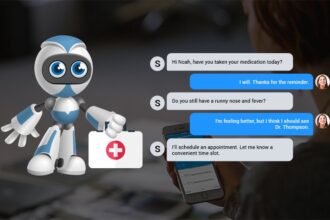Data breaches are becoming a lot more common in the healthcare sector. According to The HIPAA Journal, the number of data breaches resulting in losses of over 500 healthcare records increased from around 1 per day to 1.94 per day between 2018 and 2023.
Healthcare providers need to take stringent precautions to mitigate the risks of data breaches in healthcare. This involves using blockchain technology to improve security.
Blockchain Technology Improves Security in Healthcare
The healthcare sector has always focused on improvement and innovation to improve patients’ services. Therefore, it is one of the industries that has most benefited from advances in technology. However, industry insiders have always stated that healthcare organizations have historically been slow to adopt any technology that could transform their processes. Why does this happen? Most healthcare institutions have been focusing on clinical care, so they have often neglected financial and business processes.
But the healthcare sector has experienced several security issues over the last few years, and it’s paramount to put innovation first to prevent such problems. With the advent of cryptocurrencies and the blockchain technology, they can embrace digital transformation and pursue innovation opportunities. Cryptocurrencies are in their advanced stages, as one can easily notice if they check a btc price chart. The progression of Bitcoin’s price over the years shows that the digital currency is rooted in the financial system, and the blockchain technology supporting it is gaining traction. Now that Main Street is adopting digital currencies as investment opportunities and means of payment, healthcare organizations of all sizes could consider taking advantage of the technology’s benefits.
How does blockchain make medical data more secure?
Blockchain-powered healthcare systems can boost the privacy and security of medical information and sensitive patient data. According to statistics, over 200 million patient records have been exposed due to data breaches. Cybercriminals took hold of financial data, genetic information, and health details. The media covers high-profile breaches, but it doesn’t mean they’re the only ones. Only because many don’t hit the headlines, it doesn’t mean the issue isn’t widespread. We should also add that the compromise of data also touches pharmaceutical research and the healthcare supply chain, so not only hospitals and healthcare organizations are targeted.
The root problem is the large amount of paper the health administration uses. Deloitte revealed that a single healthcare organization files over 20,000 paper forms yearly, and around half of the healthcare transactions are completed via fax, which means documents usually arrive late. In this context, upgrading the system and switching to secure and fast technology is vital.
Additional research shows blockchain has a number of other benefits. An analysis by Forbes showed that 22 hospitals have already improved patient care by utilizing blockchain technology.
Medical authorities have brought forward the concept of Health Information Exchanges that enables healthcare specialists and patients to access and share sensitive information securely. It’s meant to boost the safety, speed, and quality of patient care and cut down the associated costs. Unfortunately, it has been quite challenging to put this concept to work due to several privacy and data security issues. It looks like the healthcare sector is facing some operational inefficiencies around IT standards and architectures.
The obstacles also make it more difficult for patients to engage with healthcare providers. The sector has witnessed several attempts at digital transformation over the years. Still, blockchain technology is the first that could provide it with an innovative model for efficient and secure Health Information Exchanges.
Blockchain technology could change more than the healthcare industry
Blockchain technology isn’t new but brings innovation in all sectors it touches. It’s a database or digital ledger that records data, making it difficult, if not impossible, to hack, alter, or cheat the system. Since its emergence, it has transformed the concepts of collaboration, trust, and privacy. While the mechanics of the ecosystem are quite complex, its concept is straightforward; it aims to decentralise data storage to prevent a single part from manipulating or controlling it. All data and transactions are verified by an advanced consensus algorithm and then cryptographically transformed into data blocks to offer a unique, immutable, and time-stamped version.
Blockchain technology enables patients to pick the part of the information they are willing to share. Therefore, potential cyber criminals cannot use a portion of their sensitive data to access a broader amount. In this context, hackers would have to breach more data to gain valuable information. All blockchain users can keep a copy of the database or ledger, and when a block needs to change the consensus, 51% of the ecosystem participants must agree. This inherent characteristic of the system boosts security and prevents any malicious cyber activity.
Blockchain technology also facilitates the introduction of smart contracts, which are scripted codes that follow a pre-established set of rules. Smart contracts work as gateways to capture standardised data, which blockchain users can access via the Application Programming Interfaces architecture.
Is blockchain the answer to the failing worldwide healthcare?
It feels like the healthcare sector has been deteriorating for decades, with increasing costs, long waiting lists, pandemics, and cybersecurity problems. The Global Health Care Outlook from Deloitte concludes that the sector is at the breaking point because COVID-19 overwhelmed organizations, exhausted workers, and affected all industry sectors.
Integrating blockchain technology would enable the distributed and decentralized ecosystem to serve and safeguard the healthcare sector.
Blockchain could improve efficiency and communication
Blockchain could facilitate a safe, efficient, effective, and transparent way of sharing information and data between the parties involved in the patient care process. By taking advantage of smart contracts and tokenization, healthcare providers have the opportunity to remove the pre-authorisation step in the process. Blockchain-based systems encrypt information and guarantee the integrity of data in communication.
Blockchain enables organizations to put the patient first
Introducing a decentralized platform into the global healthcare sector will provide a set of benefits to the patient. For example, the patient owns all medical records instead of the healthcare provider. In addition, the system’s decentralization will make healthcare accessible to everyone because the patients can provide their medical records to whatever practitioner they want to engage with.
Blockchain supports outpatient services
Patients receive care from multiple providers besides the specialists they see in hospitals. A blockchain-supported system would make it easier for all parties to collaborate because they would have access to prescriptions and medical records and could manage appointments. When the medical records are stored on the blockchain, any healthcare expert updates prescriptions in real-time, reducing the risk of errors and streamlining the data flow.
Final words
While blockchain integration in the medical field is at an early stage, innovative technology can improve the security and management of information.








